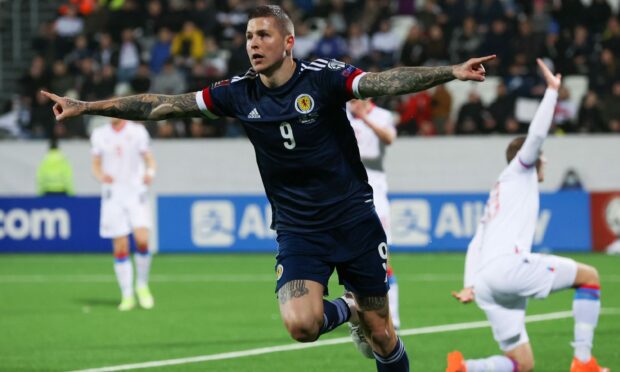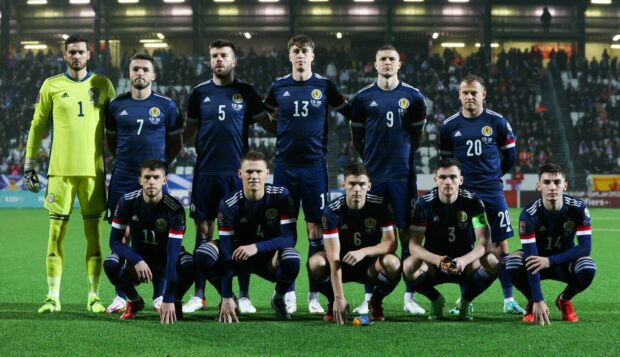Scotland got the win they needed in the Faroe Islands – but only just.
Courier Sport picks out four talking points from an unconvincing, but priceless, victory that has taken Steve Clarke’s men to within one game of a World Cup qualifying play-off.
The Celtic core is no more
It doesn’t seem that long ago Scotland teams under Gordon Strachan and Alex McLeish were built around a Celtic-heavy core.
Five or six wasn’t uncommon.
That there were none starting for Clarke in Torshavn says plenty about the decline in standards at Parkhead.
The Scotland line-up was also significant in another regard.
Not a single outfield player earns his weekly wage with a Scottish club.
Nine are based in England, and one in Belgium.
Considering the standard of the English top two divisions and that Jack Hendry’s Club Brugge are thriving in the Champions League, it’s a situation the likes of Northern Ireland, Republic of Ireland and Wales would envy.
Another first half shocker
You wouldn’t have known this was a team with seven Premier League performers in it, mind you.
A ratio of three glorious chances to none in the Faroe Islands’ favour for that first half reflects well on nobody in the visiting team other than the goalkeeper.
Some save..
Craig Gordon keeps Scotland level against Faroe Islands!
📺 Watch on Sky Sports Main Eventpic.twitter.com/Dhn7a0MbHQ
— Sky Sports Scotland (@ScotlandSky) October 12, 2021
For the second game in succession, there was an inexcusably ponderous opening 45.
Lessons from Saturday were not taken on board.
It was also worryingly panic-stricken at the back.
The three changes Clarke made to his team all had logic about them individually but when you viewed them as a collective, every part of the side was disrupted.
The back three was new, while there was a different wing-back, central midfielder and forward.
Ironically, having mentioned the lack of Celts in the side, it was the Hoops captain, Callum McGregor, who was missed most.
Scotland have been at their best – Wembley and the second half against Israel – when Billy Gilmour and McGregor have been on the pitch together and the play has been channelled through them.
Midway through the second half was too long to wait for them to be reunited.
Same old problem
Che Adams hasn’t exactly shone brightly in a Scotland shirt since he was eventually persuaded to sign up to the cause.
The Israel game was another average evening’s work to add to a growing list of them.
The Southampton man was injured for this one so Ryan Christie got the chance to stake a claim to be Lyndon Dykes’ partner.
He didn’t take it.
Thank goodness for the Dykes near post run that has been priceless in successive matches.
SCOTLAND LEAD 🏴
Dykes claiming it but Scotland won't care as they lead late on v Faroe Islands
📺 Watch on Sky Sports Main Event pic.twitter.com/k5VqV7xNwQ
— Sky Sports Scotland (@ScotlandSky) October 12, 2021
Limitations in attack will continue to hold this team back unless Adams can raise his level to match his reputation.
With Dykes and Christie suspended for the next match in Moldova, he’ll get another chance to do just that.
Better to be lucky than good
Beat bottom of the group Moldova to secure a play-off position with a game spare.
That’s the sort of scenario even a Scotland team with the issues mentioned above won’t make a mess of.
The job is all but done.
Then it will be a case of trying to secure a home tie in the play-off semi-final against Denmark at Hampden by finishing as one of the top six second-placed nations.
Momentum, in terms of results if not form, is with Scotland.
And so, you have to say, is good fortune.
Three crucial VAR decisions have gone in the Scots’ favour against Austria, Israel and now the Faroe Islands.
They were all correct calls but anybody who watches English Premier League football regularly would tell you how little that means when the off-pitch officials get involved.
It’s been many a year since the phrase ‘it’s better to be lucky than good’ has applied to Scotland so we’ll certainly not apologise for it.

